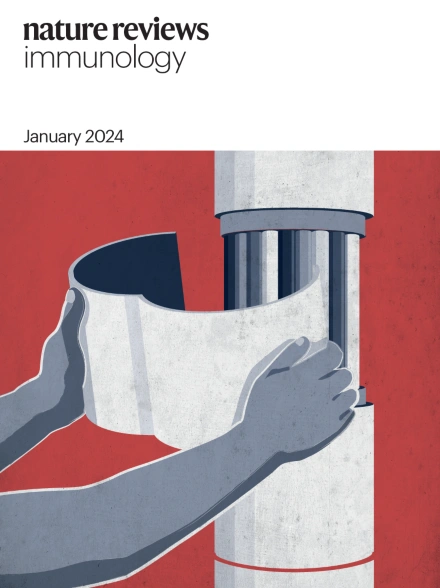靶向T细胞细胞器功能用于癌症免疫治疗。
IF 60.9
1区 医学
Q1 IMMUNOLOGY
引用次数: 0
摘要
细胞器是驱动细胞功能的内部电池、齿轮、执行器、3D打印机和发射器。它们的组成和活性因细胞类型的不同而不同,这取决于功能需求。在T细胞中,作为免疫监视和肿瘤根除的关键介质,细胞器相对较少,当细胞处于静止状态时,细胞器的功能处于基础水平。然而,在激活后,它们的数量和大小增加,并进行广泛的重塑,以支持快速增殖、效应物分化和适应不同的微环境,包括肿瘤微环境,从而能够有效地清除靶细胞。在这篇综述中,我们概述了我们对各种细胞器如何促进T细胞介导的抗肿瘤免疫的理解的最新进展。我们还讨论了调节细胞器功能的新兴策略-从细胞器靶向治疗及其作为货物递送系统的使用到天然或合成细胞器的转移或移植-这些策略有可能增强涉及免疫检查点阻断或T细胞过继转移的癌症免疫治疗。本文章由计算机程序翻译,如有差异,请以英文原文为准。
Targeting organelle function in T cells for cancer immunotherapy.
Organelles are the internal batteries, gears, actuators, 3D printers and transmitters that drive cell function. Their composition and activity vary between cell types depending on functional demands. In T cells, which are key mediators of immunosurveillance and tumour eradication, organelles are relatively few and function at basal levels when cells are at rest. However, upon activation, they increase in number and size and undergo extensive remodelling to support rapid proliferation, effector differentiation and adaptation to diverse microenvironments, including the tumour microenvironment, thereby enabling efficient clearance of target cells. In this Review, we provide an overview of recent advances in our understanding of how various organelles contribute to T cell-mediated antitumour immunity. We also discuss emerging strategies to modulate organelle functions - from organelle-targeted therapies and their use as cargo delivery systems to the transfer or transplantation of native or synthetic organelles - that have the potential to enhance cancer immunotherapies involving immune-checkpoint blockade or the adoptive transfer of T cells.
求助全文
通过发布文献求助,成功后即可免费获取论文全文。
去求助
来源期刊

Nature Reviews Immunology
医学-免疫学
CiteScore
93.40
自引率
0.40%
发文量
131
审稿时长
6-12 weeks
期刊介绍:
Nature Reviews Immunology is a journal that provides comprehensive coverage of all areas of immunology, including fundamental mechanisms and applied aspects. It has two international standard serial numbers (ISSN): 1474-1733 for print and 1474-1741 for online. In addition to review articles, the journal also features recent developments and new primary papers in the field, as well as reflections on influential people, papers, and events in the development of immunology. The subjects covered by Nature Reviews Immunology include allergy and asthma, autoimmunity, antigen processing and presentation, apoptosis and cell death, chemokines and chemokine receptors, cytokines and cytokine receptors, development and function of cells of the immune system, haematopoiesis, infection and immunity, immunotherapy, innate immunity, mucosal immunology and the microbiota, regulation of the immune response, signalling in the immune system, transplantation, tumour immunology and immunotherapy, and vaccine development.
 求助内容:
求助内容: 应助结果提醒方式:
应助结果提醒方式:


